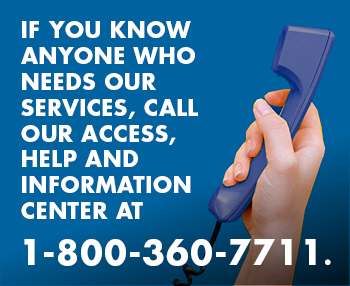
Thanks to this funding, we have been able to address some of the most urgent needs of our neighbors:
- Keep our food pantry shelves stocked, as the lines at the doors have grown longer, and distribute groceries to senior citizens in need.
- Shift many counseling and health services online.
- Make house calls to get medications and services to people who struggle with mental illness.
- Keep open, with heightened health precautions, our group homes, safe shelters for domestic violence victims, and transitional housing for people moving out of homelessness.
- Ensure that our crisis programs remain open for in-person services.
Your continued support will empower us to:
- Help people get jobs and avoid sinking into poverty. With unemployment at its highest rate in a century, millions of Americans are losing their jobs every week, a trend that especially affects low-income workers.
- Put food on the table. Hunger and food insecurity have soared, with a nearly 50 percent increase from pre-pandemic levels.
- Stay housed. Homelessness and housing insecurity are expected to rise. While the governor halted evictions and utility shutoffs and implemented other protections to keep people housed during the quarantine, the bills will come due eventually.
- Recover from domestic violence. The need for domestic violence services will climb, as victims who were trapped at home with abusers during their quarantine reach out for help.
- Overcome mental health crisis. The pandemic has spawned widespread emotional distress, expanding the need for mental health services to treat loneliness, anxiety, depression, panic attacks, and more.
We have learned, after more than 100 years of doing this work, that when a crisis occurs, people go to their local churches and agencies like ours for help. We must be ready when they come to us.
Please donate now so that together, we can help all our neighbors in need.
By providing key tax incentives to donors to non-profit organizations, the Coronavirus Aid, Relief and Economic Security (CARES) Act may encourage you to consider a financial gift to Catholic Charities, Diocese of Trenton.
What is the CARES Act?
On Friday, March 27, Congress passed and the President signed into law the Coronavirus Aid, Relief, and Economic Security (CARES) Act. This is a $2 trillion economic stimulus package legislated to provide immediate relief for nonprofits, businesses, individuals and state and local governments.
How does the CARES Act benefit donors to nonprofit organizations?
The CARES Act incentivizes charitable giving from individuals and corporations by increasing tax deductions for charitable donations.
What are individual donor benefits?
All taxpayers (both those who itemize and those who use standard deduction) can deduct up to $300 of total charitable contributions in 2020. Prior to the CARES Act, those who use standard deduction could not deduct any charitable giving.
What are the additional benefits for those who itemize their taxes?
The law lifts the existing cap on annual contributions for those who itemize their taxes, significantly raising it from 60% of adjusted gross income to 100% of adjusted gross income.
What are charitable giving incentives for corporations?
The CARES Act raises the annual limit of charitable giving that corporations can deduct from 10% of taxable income to 25% of taxable income. Food donations from corporations are raised from 15% of taxable income to 25% of taxable income.
This communication is for informational purposes only and is not to be considered legal or tax advice. Please consult with your accountant or tax advisor with regard to such matters.

